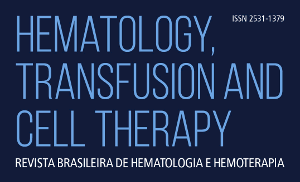ABSTRACT
Background:
Bone marrow angiogenesis is increased in multiple myeloma (MM) patients, prompting the rationale for using antiangiogenic drugs in the treatment of these patients.
Objective:
To assess angiogenesis in patients with MM at diagnosis and following treatment with an antiangiogenic drug.
Patients and Methods:
Twenty-three patients with newly diagnosed MM were treated with thalidomide-based regimens. Bone marrow evaluation was made before and following treatment and included angiogenesis assessment, which was quantified through microvessel density (MVD) determination, by means of anti-CD34 immunohistochemical labeling, and classified either as high MVD or low MVD, according to the mean CD34 count: above or below the median of 12.6.
Results:
The pre-therapy median MVD was 12 (7.5-18.3) versus 8.7 (5.35-18.5) post-therapy, p = 0.2114.
Conclusions:
Our study found no reduction in MVD before and following treatment and, accordingly, we could establish no relationship between MVD and response to therapy in the sample we studied.
Keywords
Pathological angiogenesis; Thalidomide; Multiple myeloma






